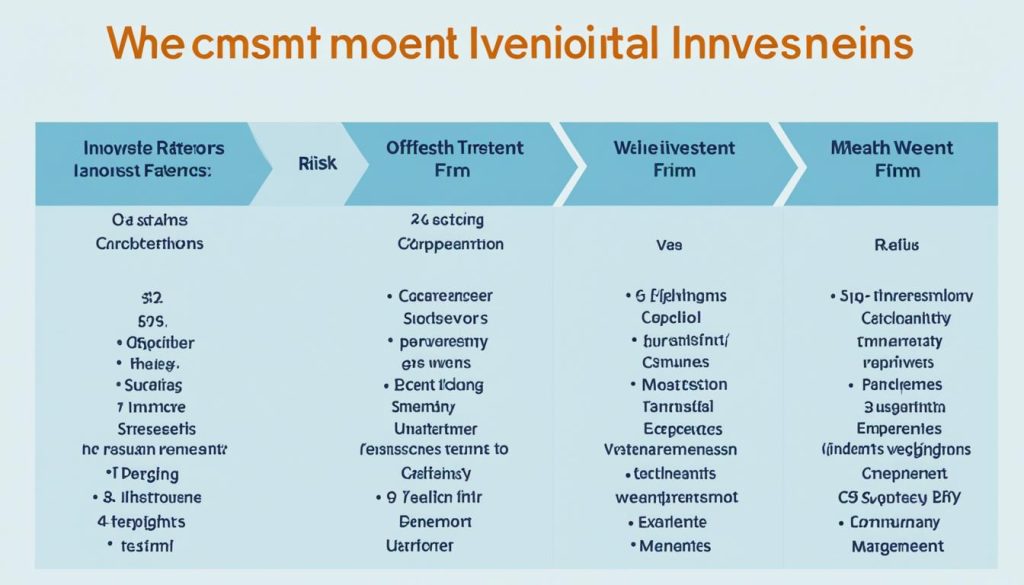Valuing a wealth management firm can be a complex task, influenced by various factors and perspectives. Whether you are a strategic buyer, a financial buyer, an individual investor, a competitor, or considering a management buyout, determining the worth of a firm requires careful evaluation.
Buyers approach valuation differently, depending on their goals and objectives. Strategic buyers, such as existing companies seeking market expansion, focus on synergies and how the acquisition will enhance their overall business strategy. Financial buyers, including private equity firms, prioritize the financial performance and potential return on investment. Individual investors and entrepreneurs consider factors beyond financial metrics, emphasizing personal fulfillment and intrinsic value. Competitors and industry insiders analyze market dynamics, competitive advantages, and strategic value. In management buyouts, the knowledge and experience of the existing management team play a vital role.
When valuing a wealth management firm, various methods can be used, including EBITDA multiples, discounted cash flow (DCF) analysis, comparable company analysis (CCA), and precedent transaction analysis. These methods provide insights into a firm’s financial performance, growth potential, and strategic value.
To assess the worth of a wealth management firm effectively, it is crucial to collaborate with experienced professionals who understand the nuances of the industry and valuation methodologies. Their expertise can guide you through the complexities and help you make informed decisions.
Key Takeaways:
- Valuing a wealth management firm requires considering the perspective of different types of buyers.
- Strategic buyers assess synergies and operational efficiency.
- Financial buyers focus on financial performance and ROI.
- Individual investors and entrepreneurs consider personal and professional goals.
- Competitors and industry insiders analyze market dynamics and strategic value.
Understanding Strategic Buyers’ Approach to Valuation
When it comes to valuing a wealth management firm, strategic buyers take a unique approach. Typically, these buyers are existing companies or corporations seeking market expansion or diversification. Their primary focus is on how the acquisition will enhance their overall business strategy and operational efficiency.
Strategic buyers assess the potential synergies that can be achieved through the acquisition. These synergies may include cost savings, revenue enhancement, and market dominance. By combining their existing resources and capabilities with those of the target firm, strategic buyers aim to create a greater value proposition for their stakeholders.
Valuation for strategic buyers often incorporates a premium for anticipated synergies. This reflects the additional value expected to be generated by the combined entity. The valuation process considers both the financial aspects, such as EBITDA multiples, and the long-term potential of the synergies.
“Strategic buyers analyze how the acquisition will contribute to their overall business strategy and operational efficiency, including synergies and growth opportunities.”
Two common methods used by strategic buyers for calculating the enterprise value are:
- EBITDA Multiples: This method values the firm based on its earnings before interest, taxes, depreciation, and amortization (EBITDA). Strategic buyers determine an appropriate multiple to apply to the firm’s EBITDA, considering the industry norm and the specific strategic advantages they expect to gain through the acquisition.
- Discounted Cash Flow (DCF) Analysis: This method evaluates the present value of the firm’s expected cash flows over a certain period. Strategic buyers take into account the projected synergies and growth opportunities to estimate the future cash flows and discount them back to their present value.
By combining their strategic objectives with a thorough analysis of the target firm’s financials and potential synergies, strategic buyers can make informed decisions about the valuation and justify the investment.
Understanding strategic buyers’ approach to valuation provides valuable insight into the considerations they prioritize. By identifying opportunities for synergies and evaluating the potential business impacts, strategic buyers can ensure that the acquisition aligns with their overarching goals and enhances their market position.
Evaluating Financial Buyers’ Perspective on Valuation
Financial buyers, including private equity firms and investment groups, approach the valuation of a wealth management firm with a focus on its financial performance. They carefully analyze the historical and projected financials, profitability measures, and cash flow to determine the potential return on investment.
For financial buyers, conducting a thorough profitability analysis is crucial in understanding the firm’s ability to generate sustainable earnings. This assessment provides insights into the firm’s growth prospects and the efficiency of its operations.
When it comes to valuation methods, financial buyers often rely on discounted cash flow (DCF) analysis and comparable company analysis (CCA). The DCF analysis considers the firm’s expected future cash flows, discounting them to their present value to determine the enterprise value.
Meanwhile, CCA involves comparing the financial metrics and valuations of similar companies in the industry to benchmark the wealth management firm’s value. This method helps financial buyers assess the firm’s relative position in the market and identify potential areas for improvement.
“Financial buyers are primarily focused on the quantifiable aspects of the business. By analyzing the firm’s financial performance and using valuation methods such as DCF analysis and CCA, they aim to make informed investment decisions.”
Collaborating with experienced financial professionals can provide valuable guidance throughout the valuation process for financial buyers. Their expertise ensures a comprehensive assessment of the firm’s financial standing and growth potential.

Understanding the Approach of Individual Investors and Entrepreneurs to Valuation
When it comes to valuing a wealth management firm, individual investors and entrepreneurs bring a unique perspective to the table. While financial metrics play a crucial role, they also consider factors beyond numbers. Lifestyle fit, passion for the industry, and the potential for personal fulfillment greatly influence their assessment. These individuals are driven by more than just monetary gain; they seek investments that align with their personal and professional goals.
For individual investors and entrepreneurs, intrinsic value holds significant importance. They look beyond the surface-level financials to understand the intangible aspects and underlying potential of a wealth management firm. Intrinsic value represents the true worth of the business, taking into account factors such as the reputation of the firm, the expertise of its advisors, and the loyalty of its clients.
When determining the valuation of a wealth management firm, methods like discounted cash flow (DCF) analysis and comparable company analysis (CCA) come into play. These approaches allow individual investors and entrepreneurs to assess the future cash flow and value of the firm by comparing it to similar businesses in the market.
Valuation for individual investors and entrepreneurs is as much about the numbers as it is about the intangibles. It’s about finding a wealth management firm that resonates with their values and aspirations, where they see potential for growth and personal fulfillment.
By conducting a discounted cash flow (DCF) analysis, they can estimate the present value of the expected cash flows generated by the wealth management firm. This method takes into account the time value of money, considering that the value of money today is worth more than the same amount in the future. Comparable company analysis (CCA) allows them to compare the financial metrics and valuations of similar wealth management firms to arrive at a fair valuation.
Ultimately, individual investors and entrepreneurs prioritize more than just financial returns when valuing a wealth management firm. They seek alignment with their personal and professional goals, looking for a business they believe in and can be passionate about. Valuation methods such as discounted cash flow (DCF) analysis and comparable company analysis (CCA) help them make informed decisions that incorporate both the financial aspects and the intangible factors that resonate with their vision.

The Personal Touch: Valuing Beyond Numbers
One of the key factors that set individual investors and entrepreneurs apart is their ability to see beyond the numbers. They consider elements like the wealth management firm’s brand reputation, client relationships, and the potential for innovation. These intangibles play a vital role in influencing their perception of a firm’s intrinsic value.
Individual investors and entrepreneurs often seek investments that align with their personal interests, values, and long-term goals. They may be passionate about certain industries or have a desire to make an impact in a particular market. This personal touch influences their valuation approach, as they evaluate the potential for personal fulfillment alongside financial returns.
While financial metrics like profitability, growth rates, and historical performance are important factors for valuation, these individuals take a holistic view of a wealth management firm. They consider the compatibility of the firm’s culture with their own values, the potential for a rewarding work environment, and the alignment of their expertise with the firm’s services.
- Valuation for individual investors and entrepreneurs takes into account:
- Alignment with personal interests and values
- Potential for personal fulfillment
- Intrinsic value beyond financial metrics
It’s not just about the returns; it’s about finding a wealth management firm that aligns with their lifestyle, passions, and long-term vision. They understand that a successful investment isn’t only about the numbers, but also about the intangibles that contribute to their personal and professional fulfillment.
Assessing Valuation from Competitors’ and Industry Insiders’ Perspective
Competitors and industry insiders play a unique role in assessing the valuation of a wealth management firm. With their intimate understanding of the market landscape, challenges, and opportunities within the industry, they conduct a comprehensive analysis to determine the worth of a firm.
Valuation for competitors and industry insiders goes beyond financial metrics. They delve deep into understanding a target company’s competitive advantages, market share, and intellectual property. These factors are crucial in evaluating the potential synergies and strategic value of an acquisition.
Comparable company analysis (CCA) and precedent transaction analysis are common methods employed by competitors and industry insiders in calculating the enterprise value. Through these analyses, they can benchmark against similar companies in the industry and gain insights from previous transactions.
For competitors, a thorough understanding of the target company’s competitive advantages allows them to assess how an acquisition may strengthen their market position and consolidate their dominance. Market share data and intellectual property assessments further contribute to a comprehensive valuation.
Industry insiders, on the other hand, bring their expertise and knowledge of the market to the valuation process. Their awareness of industry trends, shifts, and potential disruptions enable them to evaluate the strategic value of a wealth management firm. By leveraging CCA and precedent transaction analysis, they can make informed decisions and identify opportunities for growth.
Valuation from the competitors’ and industry insiders’ perspective is an intricate process that considers distinctive factors. By assessing competitive advantages, market share, and intellectual property, these buyers gain insights that shape their valuation strategies and decisions.
Competitors and industry insiders have a deep understanding of the industry landscape. By assessing these factors, they can determine the strategic value of a wealth management firm.

Valuation Considerations in Management Buyout Scenarios
When it comes to management buyout scenarios, the valuation of a wealth management firm becomes closely intertwined with the knowledge and experience of the management team. The buyer’s understanding of the company’s inner workings, growth potential, and feasibility of a successful transition plays a pivotal role in determining its worth.
The management team’s ability to secure financing is another crucial factor influencing the valuation. The availability and favorable terms of financing options can significantly impact the overall valuation of the firm. Additionally, the management team’s strategic vision for the business, including their plans for growth and strategic initiatives, may also influence the valuation.
To determine the enterprise value in management buyouts, various valuation methods are commonly employed. One such method is discounted cash flow (DCF) analysis, which calculates the present value of future cash flows. This analysis provides insights into the financial viability and potential returns of the investment.
Another frequently used method is comparable company analysis (CCA), which compares the wealth management firm with similar companies in the industry. By analyzing the financial metrics and multiples of these comparable companies, a valuation range can be established for the target firm.
Valuation in management buyouts is a complex process that requires a comprehensive understanding of the firm’s operations, market dynamics, and strategic positioning. It requires careful examination of both financial and non-financial factors, along with a deep understanding of the management team’s capabilities and vision.
By considering factors such as management team knowledge and experience, financing options, strategic vision, and employing valuation methods like discounted cash flow (DCF) analysis and comparable company analysis (CCA), buyers can make informed decisions during management buyout scenarios. These considerations ensure that the valuation reflects the true potential and worth of the wealth management firm.

Conclusion
Valuing a wealth management firm requires a deep understanding of the diverse perspectives and criteria of different types of buyers. Strategic buyers seek synergies and operational efficiency, financial buyers prioritize financial performance, individual investors and entrepreneurs consider personal and professional goals, competitors and industry insiders analyze market dynamics and strategic value, management buyouts depend on the knowledge and experience of existing management, family successors balance financial considerations with familial dynamics, and strategic investors/joint ventures explore collaborations and synergies.
Throughout these various scenarios, different valuation methods come into play. EBITDA multiples, discounted cash flow (DCF) analysis, and comparable company analysis (CCA) are instrumental in determining the worth of a wealth management firm. Each method provides unique insights into the financial and strategic aspects of the business.
When undertaking the complex task of valuing a wealth management firm, collaborating with experienced professionals can be invaluable. They possess the expertise and knowledge required to navigate the intricacies and nuances of the valuation process. By leveraging their insights, you can make informed decisions and ensure your valuation aligns with your goals and objectives.




No comments! Be the first commenter?